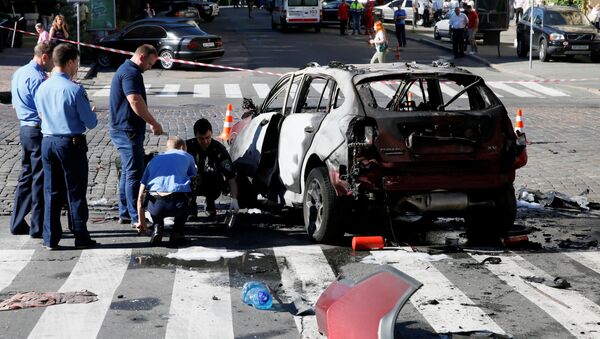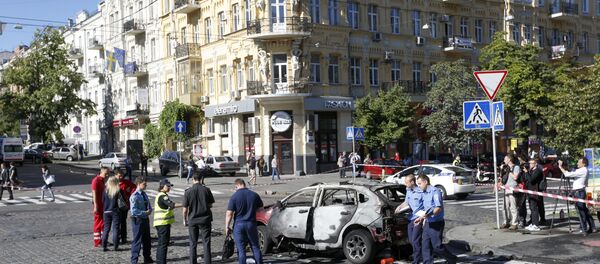Pavel Sheremet, a Russian journalist working in Ukraine, was killed in a spectacular manner in downtown Kiev in the early hours of July 20, 2016. His car exploded in a ball of fire as he drove off to work to host his morning radio show.
The execution-style murder shocked the Ukrainian public and authorities. President Poroshenko on the same day summoned the heads of Ukrainian law enforcement and security agencies to order them to solve the murder promptly. World leaders were quick to offer condolences. Russia expressed concern over the plight of journalists in Ukraine.
Yet even amid the general lawlessness and gangland style violence that has engulfed Ukraine in the aftermath of the Euromaidan coup, Sheremet’s execution-style murder is without precedent for the brazen challenge that it represents.
On the face of it, the murder makes no sense. There is no doubt that it was a well-planned and professionally executed assassination. But who is behind it?
Sheremet’s murder will make sense only if we know who benefits. One versions advanced so far is the long arm of Moscow at work. But even in Ukraine nobody takes it seriously. Russia, as a state, had no motive to kill Sheremet. He was all but forgotten in Russia, and killing him as a way to destabilize Ukraine was hardly practicable.
To get a sense of who benefits from the murder, one should consider who Sheremet was, how he was killed, and when.
Sheremet was a native of Belarus, where he began his journalistic career. There he got into trouble with the local regime, was briefly jailed, and then fled to Russia in the 1990s. He became a Russian national and made a remarkable journalistic career, becoming for a few years an anchor for the main Russian TV news program. Then he left the Russian TV, and several years ago relocated to Ukraine, expressing disagreement with Russia's policy towards the country. In Ukraine Sheremet hosted a local radio show and wrote for a popular political website.
As to the way he was killed, it’s safe to say that hardly anyone in Ukraine had ever before been killed in such a spectacular and public manner. Clearly, that was an act of terror intended to shock the public and influence public opinion.
Consistent with the pattern of earlier murders of journalists and public figures, one immediate version is that Sheremet was killed by rogue elements from the various paramilitary groups roaming the country and living off the war in the East. But such previous murders were committed on ideological grounds, and affected advocates of peace with the breakaway republics. Sheremet, by contrast, toed the official line of the Donbass’ uprising being a war with Russia. So these elements would likely have neither motive nor a need to carry out the murder in the way it was.
Next, Sheremet’s murder may be the work of factions in the Ukrainian government opposed to president Poroshenko. In his last blog post shortly before his death Sheremet explored links between crimes committed by members of the infamous Azov battalion and the minister of interior Arsen Avakov. It’s convenient to think the paramilitaries might have killed the journalist in an effort to stop him or out of sheer revenge. Yet, while it’s true that these people had reason to be unhappy with Sheremet, — just as with many other journalists critical of them, — that gave them hardly enough of a motive to kill him, especially in circumstances where doing so would make them prime suspects. Still it can’t be ruled out that Sheremet might have indeed been harassed by paramilitaries or law enforcement members who came from their ranks. If so, then it would be all the more reason for the real perpetrators of the crime to frame the paramilitaries for killing the journalist.
That leaves the third version, — that the journalist’s murder was a false flag operation by secret services aimed at discrediting the paramilitaries and weakening factions of the regime linked to them and opposed to president Petro Poroshenko. So far the president hasn’t been able to move decisively against the paramilitaries, who pose as defenders of Ukraine against “Russian aggression”. But once they are credibly implicated in a crime like that, doing so will be much easier. Undermining the radicals would solve two major problems: it would remove a direct threat to the president’s rule and do much to resolve the ongoing gridlock in parliament thwarting his political and economic agenda.
Shermet was anti-Kremlin, pro-Poroshenko, and critical of the links between the paramilitaries and the government. Now, if the Ukrainian authorities start going after the paramilitaries or those in the government linked to them for killing Sheremet (possibly on orders from Moscow), that will mean that a purge may be coming.
The views expressed in this article are solely those of the author and do not necessarily reflect the official position of Sputnik.




